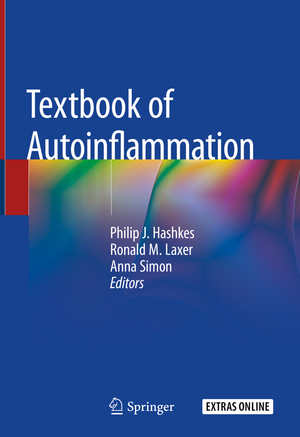Textbook of Autoinflammation
Editat de Philip J. Hashkes, Ronald M. Laxer, Anna Simonen Limba Engleză Hardback – mar 2019
The Textbook of Autoinflammation systematically describes and reviews diagnostic and treatment options for autoinflammatory disorders as well as all aspects of the concept of autoinflammation, and represents a valuable resource for professionals in a variety of disciplines who encounter these patients or who study autoinflammation.
Preț: 1403.52 lei
Preț vechi: 1477.39 lei
-5% Nou
Puncte Express: 2105
Preț estimativ în valută:
268.57€ • 280.98$ • 223.10£
268.57€ • 280.98$ • 223.10£
Carte tipărită la comandă
Livrare economică 29 martie-04 aprilie
Preluare comenzi: 021 569.72.76
Specificații
ISBN-13: 9783319986043
ISBN-10: 331998604X
Pagini: 855
Ilustrații: X, 820 p. 154 illus., 135 illus. in color.
Dimensiuni: 178 x 254 x 41 mm
Greutate: 2.33 kg
Ediția:1st ed. 2019
Editura: Springer International Publishing
Colecția Springer
Locul publicării:Cham, Switzerland
ISBN-10: 331998604X
Pagini: 855
Ilustrații: X, 820 p. 154 illus., 135 illus. in color.
Dimensiuni: 178 x 254 x 41 mm
Greutate: 2.33 kg
Ediția:1st ed. 2019
Editura: Springer International Publishing
Colecția Springer
Locul publicării:Cham, Switzerland
Cuprins
Part 1. Basic Science and Biology of Autoinflammation.- Part 2: Autoinflammatory Diseases.- Part 3: Integrative Cross Disease.- Part 4: Pharmacology and Therapies.- Part 5: Measurement and Data Analysis in Autoinflammatory Disease.
Notă biografică
Philip J. Hashkes, MD, MSc
Philip Hashkes is currently Head of the Pediatric Rheumatology Unit at Shaare Zedek Medical Center, Jerusalem, Israel and is an Associate Professor of Pediatrics at the Hebrew University in Jerusalem. He specializes in patients with autoinflammatory disorders, particularly familial Mediterranean fever, and used to work in the United States in partnership with the Autoinflammatory Clinic at the National Institutes of Health.
Ronald M. Laxer, MDCM, FRCPC
Dr. Laxer is a pediatric rheumatologist who for the last 10 years has run a specialized program in autoinflammatory diseases for both children and adults in Toronto. He is a Professor of Pediatrics and Medicine at the University of Toronto, and a Staff Rheumatologist at The Hospital for Sick Children. He is also a member of the Joint Centre for Bioethics at the University of Toronto, and Project Director at the Research Institute at the Hospital for Sick Children.
Anna Simon, MD, PhD, FRCP(Edin)
Anna Simon works as an internist, specializing in patients with autoinflammatory disorders, and is an Associate Professor of Autoinflammation at the Radboud University Medical Center, Nijmegen, the Netherlands. She is the head of the Radboudumc Expertise Center for Immunodeficiency and Autoinflammation.
Philip Hashkes is currently Head of the Pediatric Rheumatology Unit at Shaare Zedek Medical Center, Jerusalem, Israel and is an Associate Professor of Pediatrics at the Hebrew University in Jerusalem. He specializes in patients with autoinflammatory disorders, particularly familial Mediterranean fever, and used to work in the United States in partnership with the Autoinflammatory Clinic at the National Institutes of Health.
Ronald M. Laxer, MDCM, FRCPC
Dr. Laxer is a pediatric rheumatologist who for the last 10 years has run a specialized program in autoinflammatory diseases for both children and adults in Toronto. He is a Professor of Pediatrics and Medicine at the University of Toronto, and a Staff Rheumatologist at The Hospital for Sick Children. He is also a member of the Joint Centre for Bioethics at the University of Toronto, and Project Director at the Research Institute at the Hospital for Sick Children.
Anna Simon, MD, PhD, FRCP(Edin)
Anna Simon works as an internist, specializing in patients with autoinflammatory disorders, and is an Associate Professor of Autoinflammation at the Radboud University Medical Center, Nijmegen, the Netherlands. She is the head of the Radboudumc Expertise Center for Immunodeficiency and Autoinflammation.
Textul de pe ultima copertă
This book, the first complete textbook on this novel field in Medicine, comprehensively covers the clinical presentation, pathogenesis, genetics, and latest management strategies for autoinflammatory disorders as well as the basic science of autoinflammation. Relevant concepts such as how translational science of genetics and immunology relates to the innate immune system and autoinflammation are covered. Descriptions of the monogenic and polygenic/complex diseases that fall under the umbrella of autoinflammatory diseases are provided. Further topics covered include the latest clinical and genetic diagnostic approaches, concepts on the relationship between autoinflammation and autoimmunity/immunodeficiency, the role of autoinflammation in cancer, treatments and management strategies for these diseases, and potential areas of future development.
The Textbook of Autoinflammation systematically describes and reviews diagnostic and treatment options for autoinflammatory disorders as well as all aspects of the concept of autoinflammation, and represents a valuable resource for professionals in a variety of disciplines who encounter these patients or who study autoinflammation.
The Textbook of Autoinflammation systematically describes and reviews diagnostic and treatment options for autoinflammatory disorders as well as all aspects of the concept of autoinflammation, and represents a valuable resource for professionals in a variety of disciplines who encounter these patients or who study autoinflammation.
Caracteristici
Features schematic diagrams of gene and immune system pathways involved in autoinflammatory diseases assisting the reader in understanding the genes and mechanisms involved in these diseases
Contains chapters focused on sub-specialities of the immune system as well as treatments and sequels common to many autoinflammatory diseases
Provides the reader with an in depth understanding of the currently available and potential future treatments for autoinflammation
Contains chapters focused on sub-specialities of the immune system as well as treatments and sequels common to many autoinflammatory diseases
Provides the reader with an in depth understanding of the currently available and potential future treatments for autoinflammation
